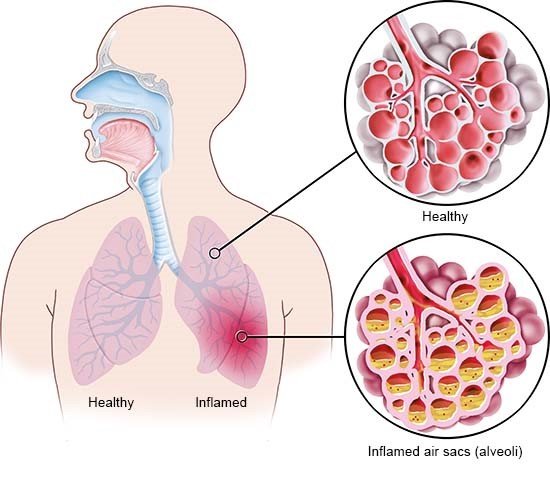Almirall J, Serra-Prat M, Bolíbar I et al. Risk Factors for Community-Acquired Pneumonia in Adults: A Systematic Review of Observational Studies. Respiration 2017; 94(3): 299-311.
Baskaran V, Murray RL, Hunter A et al. Effect of tobacco smoking on the risk of developing community acquired pneumonia: A systematic review and meta-analysis. PLoS One 2019; 14(7): e0220204.
Briel M, Spoorenberg SM, Snijders D et al. Corticosteroids in Patients Hospitalized With Community-Acquired Pneumonia: Systematic Review and Individual Patient Data Metaanalysis. Clin Infect Dis 2018; 66(3): 346-354.
Chang CC, Cheng AC, Chang AB. Over-the-counter (OTC) medications to reduce cough as an adjunct to antibiotics for acute pneumonia in children and adults. Cochrane Database Syst Rev 2014; (3): CD006088.
Chaves GS, Freitas DA, Santino TA et al. Chest physiotherapy for pneumonia in children. Cochrane Database Syst Rev 2019; (1): CD010277.
Chen X, Jiang J, Wang R et al. Chest physiotherapy for pneumonia in adults. Cochrane Database Syst Rev 2022; (9): CD006338.
Das RR, Singh M, Naik SS. Vitamin D as an adjunct to antibiotics for the treatment of acute childhood pneumonia. Cochrane Database Syst Rev 2023; 1(1): CD011597.
Deutsche Gesellschaft für Pneumologie und Beatmungsmedizin (DGP). S3-Leitlinie Behandlung von erwachsenen Patienten mit ambulant erworbener Pneumonie (in Überarbeitung). AWMF register no.: 020-020. 2021.
Eppinger M, Müller M. Pädiatrie für Studium und Praxis. Breisach: Medizinische Verlags- und Informationsdienste; 2023.
Gesellschaft für Pädiatrische Pneumologie (GPP), Deutsche Gesellschaft für Pädiatrische Infektiologie (DGPI). S2k-Leitlinie Management der ambulant erworbenen Pneumonie bei Kindern und Jugendlichen (pCAP). AWMF register no.: 048-013. 2024.
Herold G. Innere Medizin. Cologne: Selbstverlag; 2025.
Horita N, Otsuka T, Haranaga S et al. Adjunctive Systemic Corticosteroids for Hospitalized Community-Acquired Pneumonia: Systematic Review and Meta-Analysis 2015 Update. Sci Rep 2015; 5: 14061.
Huang J, Guo J, Li H et al. Efficacy and safety of adjunctive corticosteroids therapy for patients with severe community-acquired pneumonia: A systematic review and meta-analysis. Medicine (Baltimore) 2019; 98(13): e14636.
Institute for Quality and Efficiency in Health Care (IQWiG, Germany). Antibiotikatherapie: Führt eine verkürzte Einahmedauer zu vergleichbaren Behandlungsergebnissen? ThemenCheck report commissioned by IQWiG; T23-04. 2025.
Jiang S, Liu T, Hu Y et al. Efficacy and safety of glucocorticoids in the treatment of severe community-acquired pneumonia: A meta-analysis. Medicine (Baltimore) 2019; 98(26): e16239.
Kasper DL, Fauci AS, Hauser SL et al. Harrison's Principles of Internal Medicine. New York: McGraw-Hill; 2015.
Lambert AA, Lam JO, Paik JJ et al. Risk of community-acquired pneumonia with outpatient proton-pump inhibitor therapy: a systematic review and meta-analysis. PLoS One 2015; 10(6): e0128004.
Larsen T, Lee A, Brooks D et al. Effect of Early Mobility as a Physiotherapy Treatment for Pneumonia: A Systematic Review and Meta-Analysis. Physiother Can 2019; 71(1): 82-89.
Lux LJ, Posey RE, Daniels LS et al. Pharmacokinetic/Pharmacodynamic Measures for Guiding Antibiotic Treatment for Hospital-Acquired Pneumonia. (AHRQ Comparative Effectiveness Reviews; No. 136). 2014.
Marti C, Grosgurin O, Harbarth S et al. Adjunctive Corticotherapy for Community Acquired Pneumonia: A Systematic Review and Meta-Analysis. PLoS One 2015; 10(12): e0144032.
National Institute for Health and Care Excellence (NICE). Suspected acute respiratory infection in over 16s: assessment at first presentation and initial management (NICE Clinical Guidelines; No. 237). 2025.
Nguyen PA, Islam M, Galvin CJ et al. Meta-analysis of proton pump inhibitors induced risk of community-acquired pneumonia. Int J Qual Health Care 2020; 32(5): 292-299.
Padhani ZA, Moazzam Z, Ashraf A et al. Vitamin C supplementation for prevention and treatment of pneumonia. Cochrane Database Syst Rev 2021; (11): CD013134.
Prina E, Ranzani OT, Torres A. Community-acquired pneumonia. Lancet 2015; 386(9998): 1097-1108.
Robert Koch-Institut (RKI). Antworten auf häufig gestellte Fragen (FAQ) zu akuten Atemwegserkrankungen und COVID-19. 2025.
Robert Koch-Institut (RKI). Empfehlungen der Ständigen Impfkommission (STIKO) am Robert Koch-Institut 2020/2021. Epidemiologisches Bulletin 2020; 34: 4-60.
Siemieniuk RA, Meade MO, Alonso-Coello P et al. Corticosteroid Therapy for Patients Hospitalized With Community-Acquired Pneumonia: A Systematic Review and Meta-analysis. Ann Intern Med 2015; 163(7): 519-528.
Smit JM, Van Der Zee PA, Stoof SCM et al. Predicting benefit from adjuvant therapy with corticosteroids in community-acquired pneumonia: a data-driven analysis of randomised trials. Lancet Respir Med 2025; 13(3): 221-233.
Statistisches Bundesamt (Destatis). Todesursachen. 2025.
Stern A, Skalsky K, Avni T et al. Corticosteroids for pneumonia. Cochrane Database Syst Rev 2017; (12): CD007720.
Weltgesundheitsorganisation (WHO). Pneumonia in children. 2022.
Yakoob MY, Salam RA, Khan FR et al. Vitamin D supplementation for preventing infections in children under five years of age. Cochrane Database Syst Rev 2016; (11): CD008824.
Zhou YF, Luo BA, Qin LL. The association between vitamin D deficiency and community-acquired pneumonia: A meta-analysis of observational studies. Medicine 2019; 98(38): e17252.
IQWiG health information is written with the aim of helping people understand the advantages and disadvantages of the main treatment options and health care services.
Because IQWiG is a German institute, some of the information provided here is specific to the German health care system. The suitability of any of the described options in an individual case can be determined by talking to a doctor. informedhealth.org can provide support for talks with doctors and other medical professionals, but cannot replace them. We do not offer individual consultations.
Our information is based on the results of good-quality studies. It is written by a team of health care professionals, scientists and editors, and reviewed by external experts. You can find a detailed description of how our health information is produced and updated in our methods.


